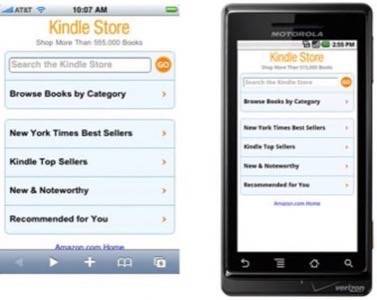Among smartphone users, Apple iPhone fans often poke fun at Android users for having to put up with so-called mobile “crapware,” the pre-installed applications that come on new Android smartphones. Mobile carriers have taken to pre-loading their phones with apps for their own services, or those from third-party developers. For some users, this bloat is made doubly worse as the apps can’t be uninstalled.

But not all “crapware” is bad. In fact, most consumers even like it. Case in point of bloatware we might not mind: Amazon’s Kindle mobile application is now going to be pre-installed on Verizon’s Android phones.
Kindle for Android Gets Preloaded
According to the two companies, the Kindle book-reading application will be pre-loaded on select Android phones, including the Samsung Fascinate (Verizon’s version of the Samsung Galaxy S), the Droid 2 and the Droid X, the latter two Motorola phones.
Like its other mobile counterparts, the Kindle for Android app lets customers shop Amazon’s e-book store, read books on their mobile phone and, thanks to Amazon’s Whispersnync technology, bookmarks, highlights, notes and your reading progress is synced between the mobile app and your other devices.

These same phones will also be pre-loaded with Verizon’s own App Store, the VCAST store, which offers a “curated” collection of Android applications, vetted by Verizon in a similar way to how Apple vets apps for its own iTunes App Store.
Pre-Installations: You Hate ‘Em, but Consumers Love ‘Em
If news of yet another pre-loaded application leaves you groaning, guess what – you’re the minority. A somewhat surprising study of consumer behavior released last month found that two-thirds of mobile customers factored in pre-installed applications into their device purchasing decisions. And only 15% (including only 6% of smartphone users) said they did not want pre-installed apps on their phones.
This begs the question: if pre-loaded apps can be done right – meaning, uninstallation is allowed, no slowing down the device, no additional advertising – could they actually serve to introduce more consumers to the benefit of mobile applications? Could they be a way for developers to reach a wider audience?
Kindle for Android is a good app, and one worthy of at least being demoed by new Android users. But is force-feeding the app to them the best way for them to sample it? Let me know what you think about this news in the comments.

















